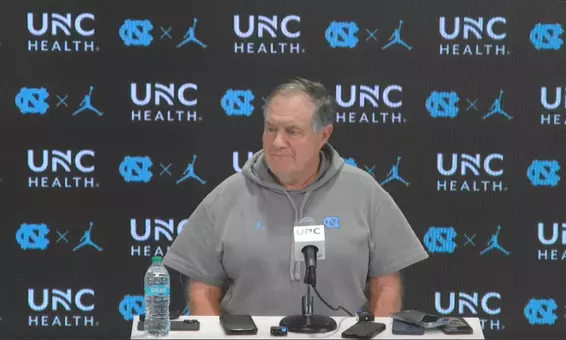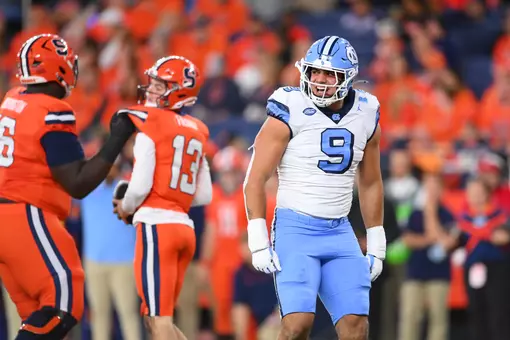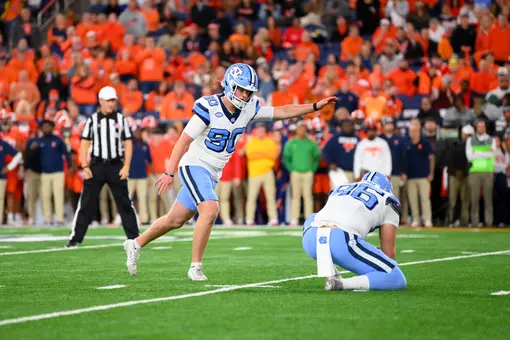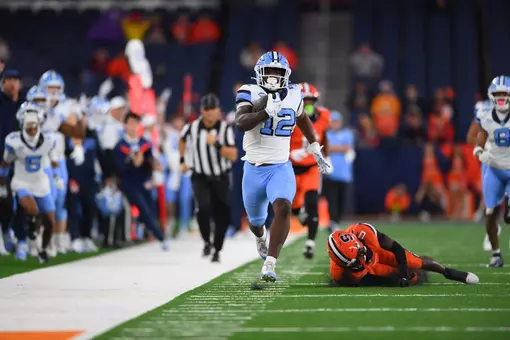University of North Carolina Athletics
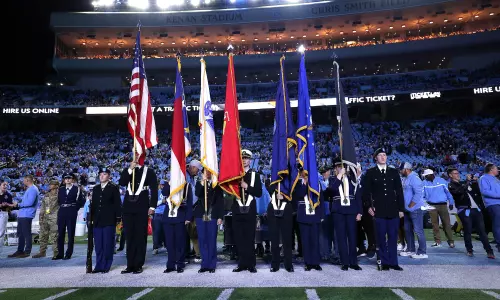
Extra Points: Military Man
November 6, 2025 | Football, Lee Pace, Extra Points
Having used noted sports and entertainment personalities like Jim Nantz, Tom Brokaw, Kyle Chandler, Damian Lewis, Gary Sinise and Tom Selleck to narrate his catalogue of World War II themed documentaries, filmmaker Tim Gray in 2017 seized upon what he thought was the perfect voice and personality to lend authority and tone to his upcoming film about June 6, 1944—the day the Allied forces launched a massive invasion of Nazi-occupied France.
Bill Belichick.
"There is no other football coach anywhere who knows as much about World War II's history as Bill does," says Gray, president and founder of the World War II Foundation. "He takes great pride in his father's role in the war, as all sons and daughters of World War II veterans do."
Just days before Memorial Day weekend 2017, the documentary hit the screen: D-Day: Over Normandy, the hour-long film standing apart from others on the subject through its modern-day aerial footage of the beaches on the north coast of France, interviews with soldiers who participated and the voice of Belichick.
"The biggest influence in my life has been my dad Steve, who played in the NFL and was also a football coach for 50 years at the U.S. Naval Academy," Belichick intones at the outset of the film (available today at PBS.org). "Like millions of other young men of his generation, my father served his country in World War II. He served in the Navy and saw duty in both Europe and the Pacific. The men and women of the World War II generation such as my father are responsible for all we have today, including my own opportunity to be a professional football coach."
Suffice it to say, there has not been a head coach at Carolina since the inception more than two decades ago of the annual Military Appreciation Day tribute with as deep a personal connection to the United States armed forces as the incumbent coach.
Steve Belichick enlisted in the Navy in 1942 and was in the Philippines when the war ended in 1945. He entered the coaching profession, working at Hiram College, Vanderbilt and then three years at Carolina under head coach George Barclay before moving in 1956 to the Naval Academy in Annapolis. Bill was four years old when his dad joined the Midshipmen, and the structure, discipline and history of the Navy seeped into his blood.
Often over five decades coaching, Belichick has used Memorial Day, Veteran's Day and the June 6th D-Day anniversary to salute and cite the bravery of American soldiers, sailors and pilots to his teams and draw parallels to the process of honing soldiers and ballplayers, of constructing armies and athletic teams. The Art of War by Sun Tzu has been a frequent Belichick reference, and among military-themed memorabilia in his Kenan Football Center office is a wooden rendition of the Stars & Stripes built to display military challenge coins, with Belichick having collected more than a hundred. One of the recent additions reflects his move to Chapel Hill and the University of North Carolina over the last year—a coin of the USS North Carolina given to him by visitors from the ship's base in Wilmington to the Tar Heels' training camp in August.
"Recognizing our servicemen was important to him," says former Tar Heel Alge Crumpler, who played for Belichick at New England. "He made sure we paid homage to those who died on Memorial Day and made sure we thanked those who served during Veteran's Day during the season."
The D-Day documentary intertwines historical photos and film clips with contemporary drone footage of the villages where important Allied battles and initiatives took place. It includes imagery of the statues, monuments and cemeteries standing today that pay tribute to heroes like Dick Winters, the American who led a dozen soldiers against ten-fold Germans in taking out four Nazi cannons at a critical strategic point in the village of Sainte Marie-du-Mont.
A moving juncture in the film shows aerial footage of the dramatic cliffs at Pointe du Hoc, where 225 American rangers navigated 100-foot cliffs under German fire in an effort to eliminate six enemy guns at the top of the cliffs.
Belichick had visited Normandy before narrating the film script and later hearing interview subjects relive the assault was indeed quite moving.
"It's pretty humbling to think about a bunch of 17- and 18-year-old kids running a couple hundred yards across the beach toward the German fortifications," Belichick says today. "It was a tough time for this country, but it was a great example of the patriotism of our citizens, men and women fighting together, pulling together and being victorious in a lot of different ways."
Gray knew of Belichick's love of military history and his respect for what Steve Belichick and the so-called "Greatest Generation" did for America that he thought it a natural to have Belichick narrate the film. It was spot-on as well that Belichick's coaching style and strategic acumen flushed royally with the military way.
"Any great coach takes something from that period of time about leadership and how to handle situations when they don't follow the initial game plan," Gray says. "There were so many great leaders on the American side of the war who learned to adapt when things went sideways. Many of those company or unit leaders in the war, who fought in some of World War II's great battles, went on to become great football coaches after the war—at the high school, college, and professional levels. They were great at tactical leadership and making the most of their opportunities, as Bill did in his NFL career. There is no one better at learning from the past and at game-planning for the current than Coach Belichick."
Saturday is Military Appreciation Day in Kenan Stadium. Among honored guests will be Kevin Shwedo, a former Tar Heel defensive back of the mid-1970s and a retired Army colonel. An All-Veteran Group Parachute Team will descend to the field prior to kickoff, and ROTC members will perform pushups on-field after every Tar Heel score.
Belichick will be too busy coaching his Tar Heels to observe the fanfare, but the point won't be lost. Just as he said in his D-Day documentary narration:
"The legacy of the men who fought on D-Day and served in Europe and the Pacific as my own father did still resonate today," Belichick said. "Their courage, determination, sacrifice and belief in their country and fellow man are unrivaled in our history. Despite the passing of my dad and more and more World War II veterans each day, I hope what they humbly accomplished will always resonate with future generations. The men and women of World War II won as a team, and that's lesson for all of us. Men like my father and millions of others gave so much to make sure we have the opportunities we have today."
Chapel Hill writer Lee Pace (Carolina '79) has been writing about Tar Heel football under the "Extra Points" banner since 1990 and reporting from the sidelines on radio broadcasts since 2004. Write him at leepace7@gmail.com and follow him @LeePaceTweet.
Bill Belichick.
"There is no other football coach anywhere who knows as much about World War II's history as Bill does," says Gray, president and founder of the World War II Foundation. "He takes great pride in his father's role in the war, as all sons and daughters of World War II veterans do."
Just days before Memorial Day weekend 2017, the documentary hit the screen: D-Day: Over Normandy, the hour-long film standing apart from others on the subject through its modern-day aerial footage of the beaches on the north coast of France, interviews with soldiers who participated and the voice of Belichick.
"The biggest influence in my life has been my dad Steve, who played in the NFL and was also a football coach for 50 years at the U.S. Naval Academy," Belichick intones at the outset of the film (available today at PBS.org). "Like millions of other young men of his generation, my father served his country in World War II. He served in the Navy and saw duty in both Europe and the Pacific. The men and women of the World War II generation such as my father are responsible for all we have today, including my own opportunity to be a professional football coach."
Suffice it to say, there has not been a head coach at Carolina since the inception more than two decades ago of the annual Military Appreciation Day tribute with as deep a personal connection to the United States armed forces as the incumbent coach.
Steve Belichick enlisted in the Navy in 1942 and was in the Philippines when the war ended in 1945. He entered the coaching profession, working at Hiram College, Vanderbilt and then three years at Carolina under head coach George Barclay before moving in 1956 to the Naval Academy in Annapolis. Bill was four years old when his dad joined the Midshipmen, and the structure, discipline and history of the Navy seeped into his blood.
Often over five decades coaching, Belichick has used Memorial Day, Veteran's Day and the June 6th D-Day anniversary to salute and cite the bravery of American soldiers, sailors and pilots to his teams and draw parallels to the process of honing soldiers and ballplayers, of constructing armies and athletic teams. The Art of War by Sun Tzu has been a frequent Belichick reference, and among military-themed memorabilia in his Kenan Football Center office is a wooden rendition of the Stars & Stripes built to display military challenge coins, with Belichick having collected more than a hundred. One of the recent additions reflects his move to Chapel Hill and the University of North Carolina over the last year—a coin of the USS North Carolina given to him by visitors from the ship's base in Wilmington to the Tar Heels' training camp in August.
"Recognizing our servicemen was important to him," says former Tar Heel Alge Crumpler, who played for Belichick at New England. "He made sure we paid homage to those who died on Memorial Day and made sure we thanked those who served during Veteran's Day during the season."
The D-Day documentary intertwines historical photos and film clips with contemporary drone footage of the villages where important Allied battles and initiatives took place. It includes imagery of the statues, monuments and cemeteries standing today that pay tribute to heroes like Dick Winters, the American who led a dozen soldiers against ten-fold Germans in taking out four Nazi cannons at a critical strategic point in the village of Sainte Marie-du-Mont.
A moving juncture in the film shows aerial footage of the dramatic cliffs at Pointe du Hoc, where 225 American rangers navigated 100-foot cliffs under German fire in an effort to eliminate six enemy guns at the top of the cliffs.
Belichick had visited Normandy before narrating the film script and later hearing interview subjects relive the assault was indeed quite moving.
"It's pretty humbling to think about a bunch of 17- and 18-year-old kids running a couple hundred yards across the beach toward the German fortifications," Belichick says today. "It was a tough time for this country, but it was a great example of the patriotism of our citizens, men and women fighting together, pulling together and being victorious in a lot of different ways."
Gray knew of Belichick's love of military history and his respect for what Steve Belichick and the so-called "Greatest Generation" did for America that he thought it a natural to have Belichick narrate the film. It was spot-on as well that Belichick's coaching style and strategic acumen flushed royally with the military way.
"Any great coach takes something from that period of time about leadership and how to handle situations when they don't follow the initial game plan," Gray says. "There were so many great leaders on the American side of the war who learned to adapt when things went sideways. Many of those company or unit leaders in the war, who fought in some of World War II's great battles, went on to become great football coaches after the war—at the high school, college, and professional levels. They were great at tactical leadership and making the most of their opportunities, as Bill did in his NFL career. There is no one better at learning from the past and at game-planning for the current than Coach Belichick."
Saturday is Military Appreciation Day in Kenan Stadium. Among honored guests will be Kevin Shwedo, a former Tar Heel defensive back of the mid-1970s and a retired Army colonel. An All-Veteran Group Parachute Team will descend to the field prior to kickoff, and ROTC members will perform pushups on-field after every Tar Heel score.
Belichick will be too busy coaching his Tar Heels to observe the fanfare, but the point won't be lost. Just as he said in his D-Day documentary narration:
"The legacy of the men who fought on D-Day and served in Europe and the Pacific as my own father did still resonate today," Belichick said. "Their courage, determination, sacrifice and belief in their country and fellow man are unrivaled in our history. Despite the passing of my dad and more and more World War II veterans each day, I hope what they humbly accomplished will always resonate with future generations. The men and women of World War II won as a team, and that's lesson for all of us. Men like my father and millions of others gave so much to make sure we have the opportunities we have today."
Chapel Hill writer Lee Pace (Carolina '79) has been writing about Tar Heel football under the "Extra Points" banner since 1990 and reporting from the sidelines on radio broadcasts since 2004. Write him at leepace7@gmail.com and follow him @LeePaceTweet.
WBB: Post-Elon Press Conference - Nov. 6, 2025
Friday, November 07
Hubert Davis Pre-Kansas Press Conference
Thursday, November 06
UNC Field Hockey: Tar Heels Drop Duke, 5-2, for Spot in ACC Final
Thursday, November 06
UNC Men's Soccer: Tar Heels Down Irish, 3-1, to Advance in ACCT
Thursday, November 06











